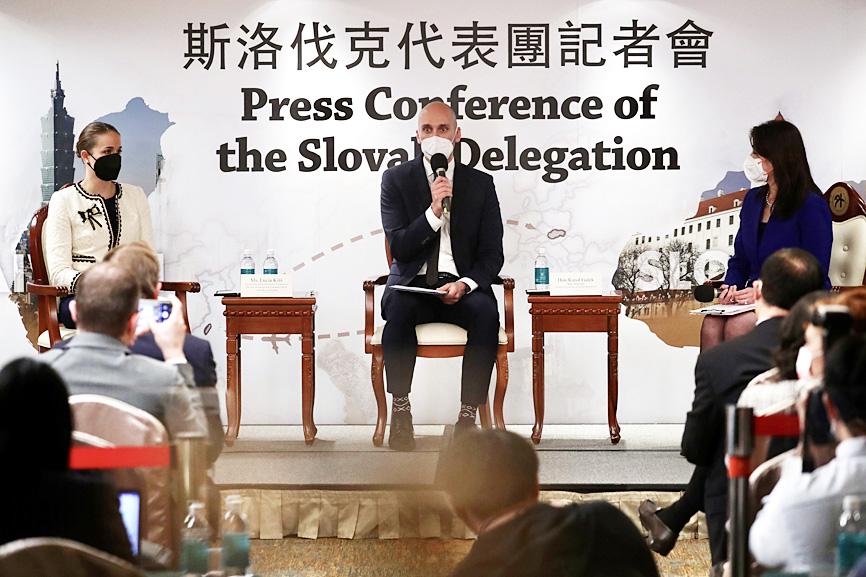Taiwan is the global leader in semiconductors and Slovakia’s second-largest investor from Asia, a delegation of Slovak officials said yesterday, adding that the visit is economic — and not political — in nature.
The 43-person delegation is to leave Taiwan today, concluding their five-day visit.
“Taiwan is an important part of our future economic diplomacy,” Lucia Kiss, director-general of economic and development cooperation at the Slovak Ministry of Foreign and European Affairs, told a news conference at the Sherwood Taipei.

Photo: Ritchie B. Tongo, EPA-EFE
Bilateral relations are not something new since the two sides established economic ties in 2003, she said, adding that the visit’s aim was to expand existing cooperation.
“This visit is an economic one, not a political one,” and is a continuation of our cooperation since 2003, she said.
Asked if the group faced any pressure from Beijing, she said: “This relationship is built on economic partnership and values.”
“The EU has an agreed common approach toward China, based on three pillars. We see China as a partner, as a competitor and as a systematic challenger,” she said.
Asked if Slovakia should brace for similar actions faced by Lithuania, with Beijing implementing political and economic sanctions for boosting ties with Taiwan, Kiss said: “There is no reason for that.”
“Any problems that a [EU] member state faces, we all face, and we all have to deal with them. It is really unfortunate ... and Slovakia feels solidarity with Lithuania,” she said.
Taiwan is Slovakia’s second-largest Asian investor, Slovak Second State Secretary of Ministry of Economy Karol Galek said.
Many Taiwanese companies, such as Foxconn (富士康), Delta Electronics Inc (台達電) and AU Optronics Corp (友達光電), have set up operations in Slovakia, with Taiwanese investments totaling 500 million euros (US$566 million) and creating 3,000 jobs, he said.
“Taiwan is the global leader in semiconductors,” laying the critical foundation for digital infrastructure, he said.
The Slovak officials also said they hoped to boost cooperation in other areas, including electric vehicles (EV), space technology, smart city, science parks and renewable energy.
Galek and some delegation members visited the Ministry of Science and Technology, Hsinchu Science Park Administration Bureau, National Space Organization and Taiwan Semiconductor Research Institute.
The world’s biggest vehicle producer per capita, Slovakia has four auto companies that also make electric and hybrid vehicles, Galek said.
Semiconductors are vital to EV development, he added.
Slovakia is also eyeing further cooperation with Taiwan in space technology, such as developing small satellites, he said.
Taiwan is good at connecting local universities and industry through science parks, and Slovakia hopes to learn from Taiwan as it does not have such a platform, he said.
The delegation and their Taiwanese counterparts inked nine memorandums of understanding to promote cooperation in talent exchanges, research and development and innovation, science parks, space technology, tourism, smart city and scientific research, the Ministry of Foreign Affairs said.
The two sides yesterday also inked a Protocol of the first Session of the Taiwanese-Slovak Commission on Economic Cooperation to lay the foundation for future cooperation, with the next session set to take place in Bratislava next year, it said.

Nipah virus infection is to be officially listed as a category 5 notifiable infectious disease in Taiwan in March, while clinical treatment guidelines are being formulated, the Centers for Disease Control (CDC) said yesterday. With Nipah infections being reported in other countries and considering its relatively high fatality rate, the centers on Jan. 16 announced that it would be listed as a notifiable infectious disease to bolster the nation’s systematic early warning system and increase public awareness, the CDC said. Bangladesh reported four fatal cases last year in separate districts, with three linked to raw date palm sap consumption, CDC Epidemic Intelligence

The manufacture of the remaining 28 M1A2T Abrams tanks Taiwan purchased from the US has recently been completed, and they are expected to be delivered within the next one to two months, a source said yesterday. The Ministry of National Defense is arranging cargo ships to transport the tanks to Taiwan as soon as possible, said the source, who is familiar with the matter. The estimated arrival time ranges from late this month to early next month, the source said. The 28 Abrams tanks make up the third and final batch of a total of 108 tanks, valued at about NT$40.5 billion

Two Taiwanese prosecutors were questioned by Chinese security personnel at their hotel during a trip to China’s Henan Province this month, the Mainland Affairs Council (MAC) said yesterday. The officers had personal information on the prosecutors, including “when they were assigned to their posts, their work locations and job titles,” MAC Deputy Minister and spokesman Liang Wen-chieh (梁文傑) said. On top of asking about their agencies and positions, the officers also questioned the prosecutors about the Cross-Strait Joint Crime-Fighting and Judicial Mutual Assistance Agreement, a pact that serves as the framework for Taiwan-China cooperation on combating crime and providing judicial assistance, Liang

A group from the Taiwanese Designers in Australia association yesterday represented Taiwan at the Midsumma Pride March in Melbourne. The march, held in the St. Kilda suburb, is the city’s largest LGBTQIA+ parade and the flagship event of the annual Midsumma Festival. It attracted more than 45,000 spectators who supported the 400 groups and 10,000 marchers that participated this year, the association said. Taiwanese Designers said they organized a team to march for Taiwan this year, joining politicians, government agencies, professionals and community organizations in showing support for LGBTQIA+ people and diverse communities. As the first country in Asia to legalize same-sex